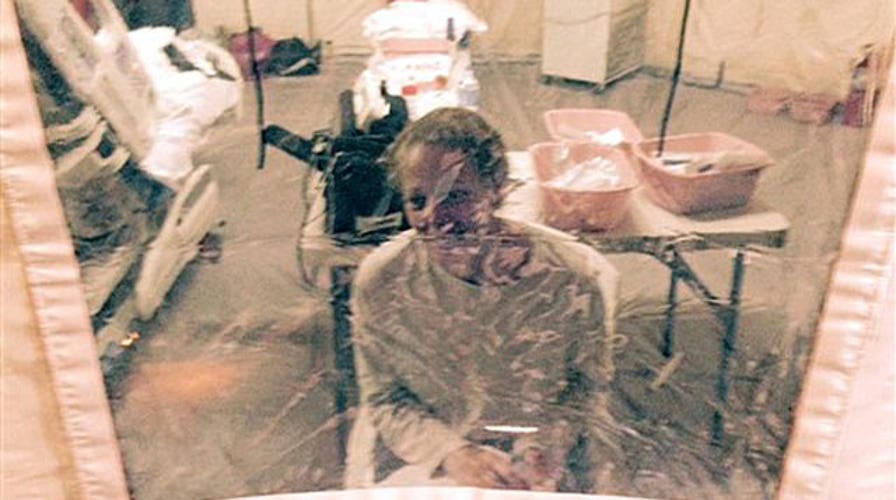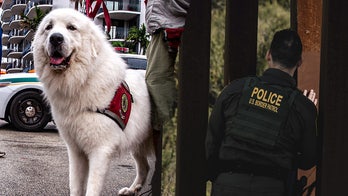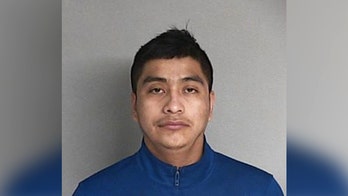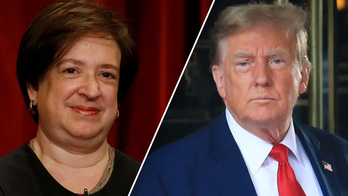An ongoing behind-the-scenes skirmish between the White House and state governors on how best to handle Ebola cases is becoming even more convoluted as several states announce they are following New York and New Jersey in ordering quarantines and other precautions that go well beyond federal guidelines -- and run contrary to Obama administration recommendations.
The many, varying state policies already are sowing confusion, and creating a patchwork of policies. In the case of a nurse returning from Africa, for instance, who complained about her treatment at the hands of New Jersey's mandatory quarantine rules, she is being transferred to her home in Maine.
Maine's policies, however, are not as strict as New Jersey's, and will allow Kaci Hickox to remain in her home under a voluntary 21-day quarantine -- though her lawyer said he expected her to only remain in seclusion for the "next day or so" while he works with Maine health officials.
On Monday, meanwhile, Connecticut Gov. Dannel Malloy ordered all travelers from Guinea, Liberia and Sierra Leone to undergo "active mandatory monitoring" for 21 days. The state then can issue quarantine orders if deemed "necessary." To date, the state has issued four quarantine orders affecting nine people (one has since been rescinded).
The Centers for Disease Control and Prevention issued new guidelines late Monday. The agency, for the first time, recommended 21 days of isolation and travel restrictions for people at highest risk for Ebola -- a nurse stuck by a needle while treating an Ebola patient in Guinea, for example -- even if they have no symptoms.
But the recommendations are just that: recommendations. And some complained the CDC guidance didn’t make things any clearer.
New Jersey Gov. Chris Christie said Tuesday he feels the CDC's latest guidance is "incredibly confusing."
"The CDC is behind on this," he said on NBC's "Today" show.
President Obama, before leaving for a campaign event in Wisconsin, on Tuesday defended the current approach and said it is important not to "discourage" health workers from battling Ebola on the frontlines. He praised the work of the U.S. team on the ground and said they're "starting to have an impact."
The president vowed to "get this problem under control" but cautioned the U.S. can't "just react based on our fears."
New Jersey and New York require three-week quarantines for anyone who treated Ebola patients in West Africa -- not just those deemed high-risk because of a needle-stick or failure to use proper protective gear.
Florida also has ordered that all people returning from that region do twice-daily health monitoring for 21 days. Those deemed high-risk can be placed in quarantine. Illinois has a similar quarantine order in place.
Meanwhile, Georgia has ordered anyone who’s had direct exposure to an Ebola patient quarantined for 21 days. Health workers, though, face a different standard and will have temperatures taken twice daily – and only be quarantined if they fail to follow the rules. Maryland and Virginia also are imposing active monitoring for travelers from the Ebola-stricken countries, but their quarantine rules are more lenient than those in New York and New Jersey.
Though New York and New Jersey took heat from the Obama administration over their quarantine policies, federal officials have stood by letting states enact tougher policies if they want.
Dr. Anthony Fauci, director of the National Institute of Allergy and Infectious Disease at the National Institutes of Health, defended the Washington policy Tuesday, but said that states have a right "to go the extra mile" if they wish. In an appearance on ABC's "Good Morning America," Fauci declined to criticize the more stringent quarantine policies implemented in New York and New Jersey by Govs. Andrew Cuomo and Christie.
The Associated Press contributed to this report.





